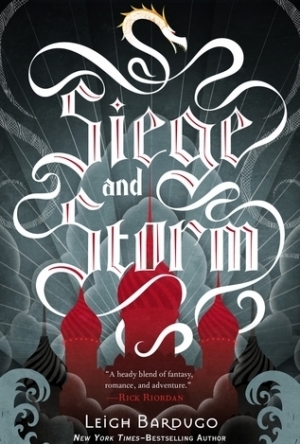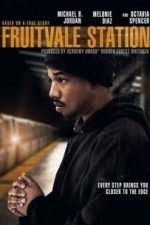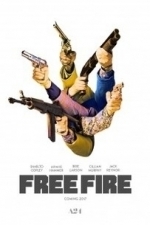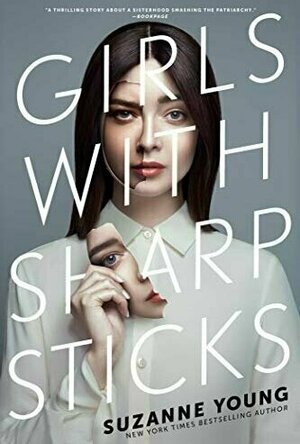Becs (244 KP) rated Siege and Storm in Books
Aug 25, 2019
TRIGGER WARNINGS: torture, murder, war themes, hallucinations, death, blood, manipulation, violence
Review:
I originally rated this 4 out of 5 stars but I am dropping it down to 3.5 out of 5 stars as I’ve had a lot of time to think about my review and have realized that Siege and Storm has middle book syndrome.
My one problem with Siege and Storm, is that it needed more of the Darkling in it. The Shadow and Bone Trilogy is about the Darkling being the villain and Siege and Storm did not deliver. You’d think there would have been more of a prescense, but there was just not enough of him! Please take Mal away and replace him with the Darkling!! Also, what in the good lordy fucks was that ending Leigh?! ARE YOU TRYING TO KILL US!? I. AM. DEAD.
I still have an ever growing dislike for Mal. He doesn’t have one bit of empathy in his body and it’s so frustrating! Like he’s supposed to be that rock that Alina can fall back onto for support and he’s just being a douche about her having powers. Can we just replace all of Mal’s scenes with more of my BB’s Nikolai and the Darkling plz?! Nikolai had the best character development and was the most relatable in the entire series thus far.
I’ve not really grown to like Alina as much like others do, as she’s still the same annoying girl that I wish wasn’t as special as she is. One thing I do like about her though, is the whole anti hero darkness she has brewing along with the inner turmoil she’s dealing with. With her new found power enhancements, but I just wish her powers weren’t vaguely talked about.
Another thing I wasn’t entirely a fan of was the love triangle *cough cough* love SQUARE *cough cough* trope that took place throughout the novel. Don’t get me wrong, it was extremely well-written and really filled in some (read: a lot of the) boring parts. BUT, this trope is extremely overrated and can really ruin a novel. It was rather annoying that Alina had all of these men to choose from and she couldn’t make up her mind about any of them. Plus, I don’t think she deserves any of them. So… yea.
Okay, onto the story itself. The first half was… such… a… bore… It was so freaking slow and I wanted to give up on it so much. It also kind of put me into a slump on picking up Ruin and Rising. I just didn’t want to be disappointed like I was with Siege and Storm. The second half of the story on the other hand, was packed to the max with intense scenes and action. I honestly thought my wittle heart would crack into a million pieces.
Leigh’s writing style is extremely unique and well-done. She’s able to write scenes that not only grip your attention, but will also pluck each heart string until that breaking point. Then it will rip your heart out of your chest with one swift moment.
Other than a few bumps, Siege and Storm was captivating to a point, but not as much as Shadow and Bone. It’s a soul sucker of a book and I’m enamored with it. The world-building is some of the best I’ve ever seen, especially for a series. The tensions in scenes is extremely palpable – making this a great sequel to an amazing series.
“You know the problem with heroes and saints Nikolai? They always end up dead.
Darren (1599 KP) rated Obey (2018) in Movies
Aug 30, 2019
Story: Obey starts as we meet Leon (Rutherford) a 19-year-old man living in London, he doesn’t have the education, he spends most of his time getting high and drinking with friends, while causing trouble with other gangs, Leon does train in boxing and is starting to wonder what his life is meant to be.
As the violence in the surrounding neighbourhood, Leon starts to question everything more, as he sees his friends acting out causing bigger problems, while he homelife isn’t getting any better with his alcoholic mother, stopping him from getting a chance to improve himself and the woman he meets Twiggy (Clark) only gives him mixed messages.
Thoughts on Obey
Characters – Leon is the 19-year-old man that was raised in the London, where he has become part of a gang, didn’t get a chance at an education and is left facing a life of uncertainty. Leon is feeling like life is going no where now and he wants to do something about it, this could see him go back into education or continue his training in boxing, but the reality comes with him that he just doesn’t want to get involved in criminal actions going on within London, it is a make or break time for the young man, that we completely understand his position in life. Twiggy is the woman that Leon meets, she has been squatting in London with her boyfriend, though she is a free spirit that isn’t looking for trouble, which makes her different to everybody else in Leon’s life. Anton is her boyfriend that we don’t learn to much about other than he is happy to hang out with whoever and fights for rights. We do get to meet most of the gang Leon is in, though the names are easy to forget, they represent a life of crime he could fall into, Leon’s alcoholic mother and her abusive boyfriend, each character does seem to reflect a life Leon could have.
Performances – Marcus Rutherford easily gives us a standout performance in this film, he will make you understand every single situation his character is going through, which is a delight to watch. Sophie Kennedy Clark is everything she needs to be, with the whole supporting cast making you feel like you are part of this world that Leon is living through.
Story – The story here follows a young man who grew up in London as part of a gang, who isn’t given a chance of a future, until he meets a stranger and is left to decide what he wants for his own future. This story is a true eye opener when it comes to showing us how the gang situation happens, is treated and how hopeless somebody could be if they are trapped within it. We do only follow one person, who is given a few outs, through support, a woman, but is also held back by his lack of education, his gang friends and caring for his addict mother. This does show us how hard the life can be, how the mentality can see the person making the wrong decisions, how the outsiders can see them as wrong, rather than not given a chance. This is an important story for the people of England to see and one that could open up more eyes to what the problems really are, not what they think they are.
Settings – The film is set in London, this does show us just how difficult the life would be for Leon and other young people in this location, if they haven’t been given a chance.
Scene of the Movie – The journey.
That Moment That Annoyed Me – Not enough development of the supporting characters.
Final Thoughts – This is one of the most important eye openers in the world of film, it doesn’t glorify anything, just keeps it feeling realistic throughout the film.
Overall: Important drama.

Shadow Fight Battle Warriors 2
Games and Entertainment
App
Shadow Fight Battle: Super Hero Warriors Legend - The popular VS fighting game on Apple Store. ...

Ultimate Angry Shark Simulator 3D
Games and Entertainment
App
Sharks are the ultimate, dangerous, horrific and terrifying creatures underwater. The great white...

Anonymous Chat Rooms, Dating
Dating, Lifestyle and Social Networking
App
Cool chat rooms. Self-destructing messages. Talk about anything with strangers. Meet new people, ask...
Kirk Bage (1775 KP) rated Fruitvale Station (2013) in Movies
Aug 6, 2020
Borderline superstar Michael B. Jordan owes his career to Ryan Coogler, which began in earnest in 2013 with the strong effort of true story Fruitvale Station, highlighting the life and final moments of Oscar Grant, who was one of a tragically long list of innocent young men murdered by the police in modern America. Since then he has gone on to star as the eponymous Creed and as the popular Erik Killmonger in Black Panther, making him more or less the most famous black actor under forty currently at work.
I mention him first because having seen the other two films first, I have to admit I wasn’t quite getting it. I mean he is fine in both movies, but nothing world beating. Then you go back to his acheivement in the earlier film and begin to see what he might be capable of given the right scripts. He pretty much embodies Oscar Grant to a degree you believe you are watching a documentary. Which is the major plus point of Ryan Coogler’s direction also.
By pulling us in to the family life of Oscar, as if we were a fly on the wall, we become connected to their story as if we were part of that inner circle, making the inevitable horror of events hit home all the harder. We watch mundane events and conversations take place with a shadow of foreboding that never crosses over into foreshadowing or signposting. The balance is very nicely done.
Melonie Diaz, as girlfriend Sophina, and especially the ever wonderful Octavia Spencer, as loving but grounded mother Wanda, offer solid support, but the camera clings to Jordan by choice, asking us to place ourselves in his shoes and feel the empathy first hand. It is a sober journey, almost totally devoid of directorial flair, which is both a strength and a weakness, ultimately.
With such an awful, heart-rending subject, it can be difficult to remove yourself into a dispassionate view of a film artistically, as the message overpowers your emotions. The best thing that can be said in this case is that the drama never crosses the line of sentimentality or overkill; it merely presents events as they were and asks you to draw your own conclusions. Having said that, I can’t over-praise it simply because the subject needs to be seen, heard, discussed and acted upon with total immediacy in the real world.
This film is already seven years old, and the issues are more pertinent than ever before, as the BLM movement rages all over the world, but especially in the USA, where the culpability and violence of police officers must be addressed and resolved before the loss of one more innocent life. The message delivered by the film is clear and unambiguous – it has to be heeded. And in that sense it is an indespensible film of great power, I would advise you to see.
And with that, it seems a moot point to criticise it, because there isn’t anything negative to say that would say anything useful. I would just say again that it doesn’t quite make the grade of the best 200 films since the Millennium. Whereas, BlacKkKlansman does. An unfair comparison in many ways, but an obvious one in others. See both. Think about them, do what you can, and help make hatred and prejudice a sad fact of history.
Decinemal Rating: 70
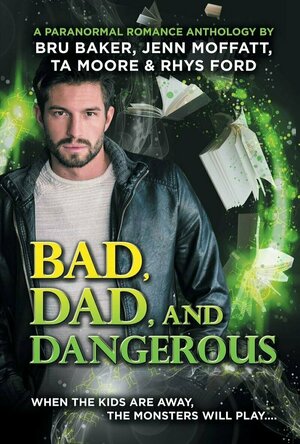
Bad, Dad, And Dangerous Anthology
Rhys Ford, TA Moore, Bru Baker and Jenn Moffatt
Book
Bad, Dad, and Dangerous Anthology When the kids are away, the monsters will play. School’s out...
Paranormal Romance MM MF

h Find The Differences 1 HD
Games and Entertainment
App
(app description below) 22.12.16 Lots of people killing during Robert Kocharyan presidential period...
Bob Mann (459 KP) rated Free Fire (2017) in Movies
Sep 29, 2021
Set in Boston in 1978, an arms deal is going down in a deserted warehouse. Brokered by Justine (Brie Larson, “Room”) an IRA team headed by Frank (Michael Smiley, “The World’s End“) with his business guy Chris (Cillian Murphy, “Inception”, “Batman Begins”) are on the buying side. As ‘roadies’ they’ve brought with them a couple of crack-head friends Stevo (Sam Riley, “Brighton Rock”, “Maleficent“) and Bernie (Enzo Cilenti, “The Martian“) who are far from stable.
On the selling side is South African dealer and “international asshole” Vern (Sharlto Copley, “Elysium“), his suave and wisecracking protector Ord (Armie Hammer, “The Man From Uncle”) and Vern’s right hand man Martin (Babou Ceesay, “Eye in the Sky“). What connects all of these individuals is that no-one likes or trusts anyone else.
Unfortunately, one of Vern’s van drivers is John Denver-lover Harry (the excellent Jack Treynor, “Sing Street”) who has very recent personal history with Stevo. The fuse is lit, and when the two meet chaos ensues: in the words of Anchorman’s Ron Burgundy, “That escalated quickly”!
And, for a 90 minute film, that’s basically it. If you think after viewing the trailer “there must be more to the film than this”…. you’re wrong!
However, what there is of it is enormously entertaining. Played ostensibly for laughs, with very very black humour and an F-word and a gunshot in every other sentence, some of the characters – notably those played by Sharlto Copley, Arnie Hammer and Brie Larson – have some hilarious dialogue. The star turn for me though was Jack Treynor who was just so impressive as the ‘lost at sea’ brother in the delightful “Sing Street” and here delivers a stand-out performance as another brother on a mission… this time a mission of vengeance. You are waiting throughout the film for the inevitable showdown between Harry and Stevo – – and when it comes it is both bloody and memorable.
A cracking 70’ soundtrack, put together by the Portishead duo of Geoff Barrow and Ben Salisbury, involves 70’s classics by Credence Clearwater Revival, John Denver and The Real Kids and it’s hammered out at top volume over the action. The downside of this effect is that – for my old ears at least – it sometimes make some of the dialogue hard to follow.
As a policing exercise, the film clearly has merit. In the same manner as Schwarzenegger’s “Running Man” put criminals in an arena to cull them, so this must have reduced the crime rates in both Boston and Belfast no end! While some may not approve of the levels of violence on show, it is all done in a highly cartoonish way: like a “Tom and Jerry” cartoon, or “Home Alone”, everyone seems to get shot multiple times and yet (in the main) is still active and mobile. All of this makes criticism of the performances something of a waste of time, but I would comment that some of the acting is of the “over the top” variety: surprisingly, I found some of Oscar winner Brie Larson’s scenes falling into this category and snapping me out of the narrative at times.
But overall, my evaluation is now done and I am rooting on the side of it being a brash and exhilarating minor masterpiece. Yes, it’s one-dimensional. Yes, it is virtually impossible to feel any empathy with any of the characters, as they are all universally loathsome. But it’s a movie whose flaws are forgivable based on the characterisation and the cracking good script by long-term collaborators Ben Wheatley and Amy Jump.
Tight as it is within its 90 minute running time, I very much doubt you will be bored.
Heather Cranmer (2721 KP) rated Girls with Sharp Sticks (Girls with Sharp Sticks #1) in Books
Oct 19, 2022
Philomena aka Mena is one of the beautiful girls. In fact, all the girls at her all girls boarding school are beautiful. They are taught how to behave. They're only allowed salads for food, and their classes focus more on etiquette and how to act in male company. They are all fully obedient until one day something awakens in Mena. She realizes that not all is as it seems at her boarding school. Something sinister is going on, and Mena will do anything to find out to protect her friends.
The plot of Girls with Sharp Sticks has been done before. In fact, much of the plot reminded me so much of the 2018 film Level 16 with a few differences. However, I still really enjoyed the plot. While one of the major plot twists became obvious to me about halfway through the book, there were still a few plot twists that I never would have predicted. Throughout my reading of this book, I felt like I was standing right there in the pages watching everything unfold. Yes, there were some over the top things that happened in the story, but this didn't put me off. I loved that this novel didn't have much romance in it. There is a very light romance though.
I very much enjoyed the creepy boarding school setting with it's very strict teachers (the majority of them male). As this is a series, there is a minor cliff hanger, but I feel like this book can be read without having to read the other books in the series unless you want to know what happens afterwards. You could just read Girls with Sharp Sticks and leave it with the happyish ending though if you really wanted to.
I enjoyed reading about all the characters even the vile ones. Mena certainly was an interesting character with her thought process and how fearless she was. Her curiosity did get her in trouble from time to time, but she persevered to get to the bottom of what was happening at her school in order to protect her friends. Guardian Bose was easy to hate because of how horrible he treated the girls. I just wanted him to go away because he was so mean! I had a love hate relationship with Anton. On one hand, I felt that he cared about the girls in his own way, but I knew he was not to be trusted at all. Jackson had an interesting back story, but after learning his back story, I was left wanting to know more about him. My favorite character throughout the book was Valentine. There was just something about her. In my mind, I had pictured her a a beautiful frail girl, but looks can be deceiving! I was hoping we'd get to read more about her throughout the book than what we did. Valentine was the best part of the book in my opinion.
Trigger warnings for Girls with Sharp Sticks include profanity, blackmail, brainwashing, violence, mentions of sexual assault, and murder.
All in all, Girls with Sharp Sticks is an engrossing read with its interesting character and a plot that will have you cheering on the young women as they try to figure out what's going on at their school. I would definitely recommend Girls with Sharp Sticks by Suzanne Young to those ages 16+ who are sick of being told what to do by the patriarchy.
